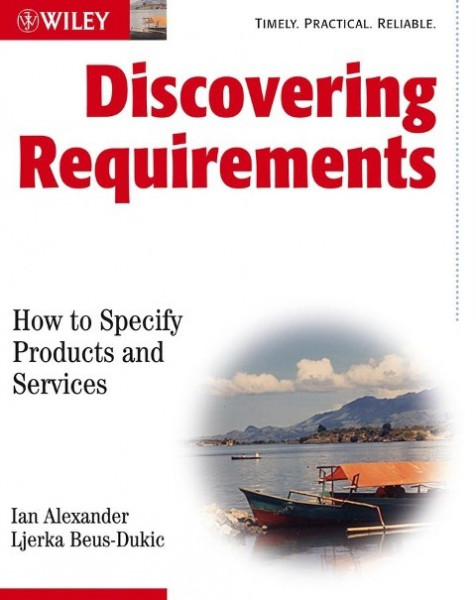
Discovering Requirements
Kurzinformation
inkl. MwSt. Versandinformationen
Lieferzeit 1-3 Werktage
Lieferzeit 1-3 Werktage

Beschreibung
"This book is not only of practical value. It's also a lot of fun to read." Michael Jackson, The Open University. Do you need to know how to create good requirements? Discovering Requirements offers a set of simple, robust, and effective cognitive tools for building requirements. Using worked examples throughout the text, it shows you how to develop an understanding of any problem, leading to questions such as: * What are you trying to achieve? * Who is involved, and how? * What do those people want? Do they agree? * How do you envisage this working? * What could go wrong? * Why are you making these decisions? What are you assuming? The established author team of Ian Alexander and Ljerka Beus-Dukic answer these and related questions, using a set of complementary techniques, including stakeholder analysis, goal modelling, context modelling, storytelling and scenario modelling, identifying risks and threats, describing rationales, defining terms in a project dictionary, and prioritizing. This easy to read guide is full of carefully-checked tips and tricks. Illustrated with worked examples, checklists, summaries, keywords and exercises, this book will encourage you to move closer to the real problems you're trying to solve. Guest boxes from other experts give you additional hints for your projects. Invaluable for anyone specifying requirements including IT practitioners, engineers, developers, business analysts, test engineers, configuration managers, quality engineers and project managers. A practical sourcebook for lecturers as well as students studying software engineering who want to learn about requirements work in industry. Once you've read this book you will be ready to create good requirements! von Alexander, Ian F;Beus-Dukic, Ljerka;
Produktdetails

So garantieren wir Dir zu jeder Zeit Premiumqualität.
Über den Autor

- Kartoniert
- 256 Seiten
- Erschienen 2016
- DIN Media

- Kartoniert
- 286 Seiten
- Erschienen 2006
- O'Reilly and Associates

- Taschenbuch
- 218 Seiten
- Erschienen 2012
- Morgan & Claypool Publishers

- Hardcover
- 241 Seiten
- Erschienen 1999
- Mcgraw Hill Book Co

- Hardcover
- 384 Seiten
- Erschienen 2010
- Wiley

- Hardcover
- 392 Seiten
- Erschienen 2009
- Information Science Reference

- Hardcover
- 192 Seiten
- Erschienen 2015
- Manning

- Hardcover
- 276 Seiten
- Erschienen 2000
- Springer

- Gebunden
- 200 Seiten
- Erschienen 2017
- Campus Verlag

- Taschenbuch
- 440 Seiten
- Erschienen 2013
- Sage Publications Ltd

- Gebunden
- 334 Seiten
- Erschienen 2007
- Springer

- Hardcover
- 352 Seiten
- Erschienen 2020
- Wiley-Scrivener

- Hardcover
- 312 Seiten
- Erschienen 2002
- Morgan Kaufmann

- Taschenbuch
- 384 Seiten
- Erschienen 2005
- Pearson Education

- Hardcover
- 400 Seiten
- Erschienen 2012
- Wiley-Blackwell

- Gebunden
- 262 Seiten
- Erschienen 2006
- Springer

- Gebunden
- 240 Seiten
- Erschienen 2008
- Springer Berlin Heidelberg




 bestellen
bestellen




















